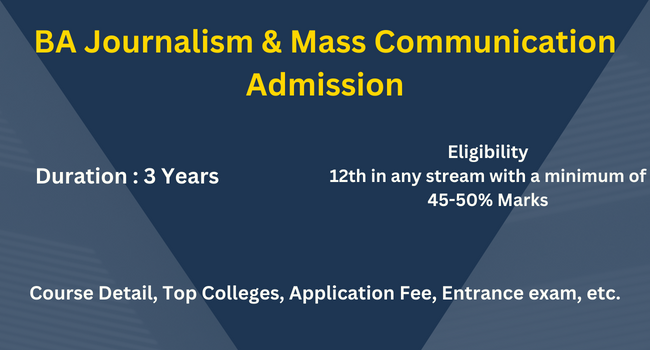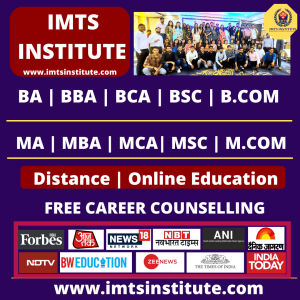BA JMC Admission 2024: The BA in Journalism and Mass Communication is a 3-year undergraduate program that helps students prepare for careers in media, journalism, and communication. To apply, candidates must have completed 10+2 with a minimum of 50% marks from a recognized board. The course covers subjects like News Reporting, Media Law, Digital Media, and Public Relations. The application process is typically online, and the application fee ranges from INR 300 to INR 1,500. Graduates can pursue careers in journalism, public relations, and content creation. The course also helps students develop skills in media ethics and communication theory.
- The BA in Journalism and Mass Communication (Distance Education) focuses on media studies, news writing, and mass communication principles. It equips students with skills to work in journalism, digital media, public relations, and broadcasting.
- Duration: The course duration ranges from 3 to 6 years, allowing flexibility for students to complete it at their own pace.
- Structure: Core subjects include Media Law, Reporting, Advertising, Public Relations, and Digital Media. The program combines both theoretical and practical aspects, focusing on media ethics and communication skills.
- Educational Qualification: Candidates must have completed 10+2 from a recognized board, securing at least 45-50% aggregate marks.
BA JMC Admission Key Points:
- Course Full Name: Bachelor of Arts in Journalism and Mass Communication (BA JMC)
- About Course: The BA JMC is a graduate-level program that helps you in gaining practical skills in writing, editing, and managing media content. Various job roles are available in news agencies, TV channels, online media, and corporate communication departments.
- Eligibility Criteria: To apply for BA JMC Admission, you must have completed 10+2 in any stream with at least 45-50% marks.
- Entrance Exam: Few universities allow admission on the basis of exams like CUET or another specific test.
- Program Duration: The course is usually 3 years long.
- Course Curriculum: You will study subjects like Mass Communication, News Reporting, Media Laws, Digital Journalism and Public Relations
- Career Opportunities: After completing the BA JMC course, you can work as a Journalist, Content Writer, Public Relations Officer, Digital Marketer, TV Anchor and more.
- Average Salary: Your salary will vary from INR 3 LPA to INR 7 LPA.
- Approx. Fees: The annual tuition fee differs from INR 10,000 to INR 50,000 per year.
BA JMC Admission 2024 Highlights
| Course Name | BA in Journalism and Mass Communication |
| Full Form | Bachelor of Arts in Journalism and Mass Communication |
| Eligibility | 10+2 with a minimum of 50% marks from a recognized board |
| Duration | 3 years |
| Average Course Fees | ₹10,000 – ₹50,000 per year |
| Entrance Exams | CUET, DUET, IPU CET, IMTS Entrance Exam |
| University Name | IMTS Institute |
| Minimum Percentage Required | 50% in 10+2 |
| Study Mode | Full-time, Distance, Online |
| Subjects | Media Laws, News Reporting, Public Relations, Digital Media, Advertising |
| Program Level | Undergraduate |
| Age Limit | Usually 17-25 years |
| Job Roles | Journalist, News Anchor, Public Relations Officer, Content Writer, Social Media Manager |
| Average Salary Offered | ₹3,00,000 – ₹6,00,000 per annum |
What is BA JMC?
Bachelor of Arts in Journalism and Mass Communication (BA JMC) is a three-year undergraduate program that prepares students for careers in media and communications. BA JMC admission equips students with essential skills in writing, reporting, and content creation across different media platforms including print, broadcast, and digital media.
The program combines theoretical knowledge with practical training in areas like news reporting, content writing, media production, and public relations. Students learn core subjects including Communication Theory, Digital Media, Photo-Journalism, Radio Production, and Media Ethics. The curriculum emphasizes developing critical thinking, research abilities, and professional communication skills.
Why Choose BA JMC?
- Comprehensive Media Education: Students gain thorough knowledge of journalism fundamentals, mass communication theories, and modern digital media practices.
- Practical Skill Development: Hands-on training in news writing, editing, photography, radio production, and video content creation prepares students for real-world media careers.
- Industry-Relevant Curriculum: The program covers current trends in digital journalism, social media management, and content creation, making graduates industry-ready.
- Creative Career Options: Students can specialize in various fields like digital media, advertising, public relations, or broadcast journalism based on their interests.
Benefits of Choosing BA JMC Admission
- Diverse Career Opportunities: Graduates can work as journalists, content writers, public relations officers, radio jockeys, or digital media managers.
- Growing Industry Demand: The expanding digital media sector offers increasing job opportunities with competitive salaries.
- Skill-Based Learning: Students develop essential skills in writing, editing, photography, and digital content creation through practical assignments.
- Industry Connections: Regular workshops, internships, and industry interactions help build professional networks.
- Flexible Career Paths: The program allows students to choose specializations aligned with their interests and career goals.
BA JMC Admission Process
- Application Timeline: Most universities open admissions between March and June 2025
- Entrance Exams: Some colleges conduct entrance tests focusing on:
- English Language Proficiency
- Current Affairs Knowledge
- Media Awareness
- Logical Reasoning
Selection Process:
- Merit-based admission using 12th marks
- Entrance exam scores
- Personal interview (in some colleges)
BA JMC Application Eligibility Criteria
- Educational Qualification: 10+2 completion in any stream from a recognized board
- Minimum Marks: 50% aggregate in Class 12 (45% for reserved categories)
- Age Limit: No specific age restrictions in most institutions
- Language Proficiency: Good command over English and communication skills
BA JMC Fee
- Average Course Fee: INR 2,000 – 5 Lakh (varies by institution)
- Application Fee: INR 500-2,000
Additional Costs:
- Study materials and books: INR 5,000-10,000 per year
- Project work and practical assignments: INR 3,000-5,000 per semester
- Computer lab and media studio fees: As per institution
- Educational trips and workshops: Variable costs
BA JMC Admission: How to Apply?
Step 1: Research and Choose
- Visit official college websites
- Compare course fees and structures
- Review admission requirements
Step 2: Online Application
- Register on the university portal
- Fill in personal and academic details
- Upload required documents
- Pay application fees
Step 3: Entrance Exam
- Download admit card
- Appear for entrance test (if applicable)
- Check results on official website
Step 4: Merit List
- Monitor university website for merit list
- Check your name and rank
- Download allotment letter
Step 5: Document Verification
- Visit campus with original documents
- Complete verification process
- Pay first semester fees
Step 6: Final Admission
- Collect admission letter
- Complete admission formalities
- Attend orientation program
Documents Required
- Essential Documents
- Class 10th marksheet and certificate
- Class 12th marksheet and certificate
- Transfer/Migration certificate
- Character certificate
- 4-6 passport size photographs
- Valid ID proof (Aadhar Card/PAN Card)
- Category certificate (if applicable)
- Domicile certificate (if required)
- Entrance exam admit card (if applicable)
BA JMC Structure and Curriculum
| Semester | Subjects |
|---|---|
| Semester 1 | Fundamentals of Communication Skills, English Literature I, Fundamentals of Computers, Reporting (Theory & Practical), Fundamentals of Journalism |
| Semester 2 | Writing for Media (Theory & Practical), English Literature II, Introduction to Indian Constitution, Editing (Theory & Practical), History of Media |
| Semester 3 | Radio Broadcasting (Theory & Practical), Photojournalism (Theory & Practical), TV Broadcasting (Theory & Practical), Introduction to Cinema |
| Semester 4 | Advertising (Theory & Practical), Magazine Journalism, Public Relations, Internet & New Media |
| Semester 5 | Environment & Media, Media Criticism, Media, Society & Development, Basic Media Research |
| Semester 6 | Information Society, Media Law & Ethics, Organizational Behavior, Project Work |




